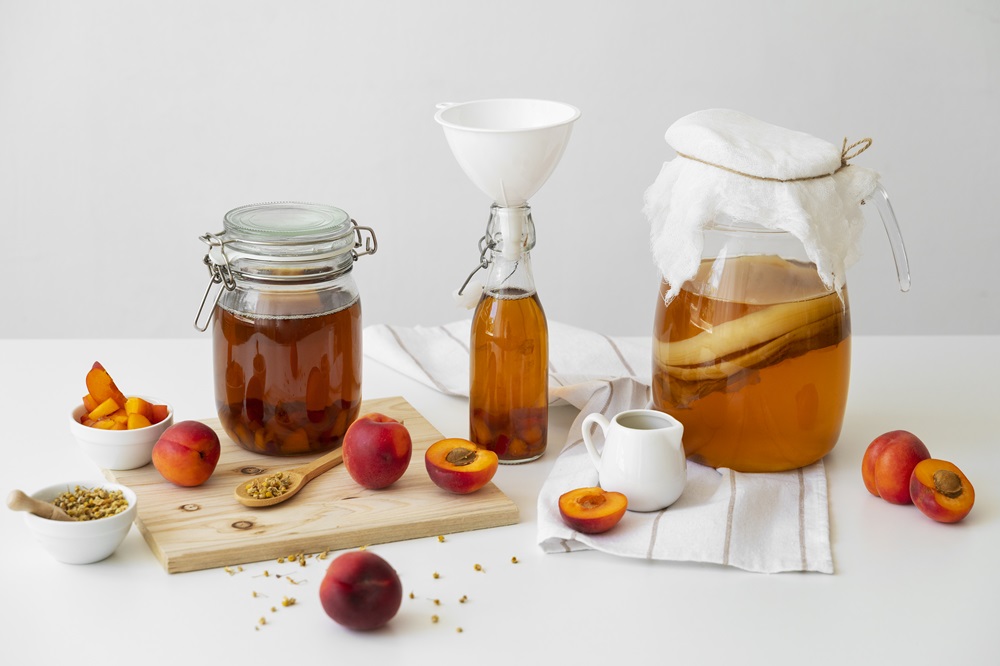Kombucha – Properties, Characteristics, and Contraindications

Kombucha is a fermented tea beverage that’s gaining popularity among consumers worldwide. It's a unique alternative to traditional carbonated drinks and is believed to offer several potential benefits, such as antibacterial and antioxidant effects. What exactly is kombucha? What does it taste like? Is kombucha harmful - or is it safe to drink?
Table of contents
Kombucha - what is it?
Kombucha, also known as kombucha tea, is a fizzy drink with a sweet-tart flavor and a slightly fruity aroma. It's made by fermenting sweetened tea with a symbiotic culture of bacteria and yeast, commonly referred to as SCOBY (Symbiotic Cultures of Bacteria and Yeasts). This refreshing beverage originates from Manchuria, in northeastern China, and has a flavor similar to apple cider. The earliest records of kombucha date back to around 220 BCE.
Classified as a fermented food, kombucha undergoes fermentation at room temperature, usually for about 10 days. While it can be made from various types of tea, it’s most often prepared using black tea and white sugar.
Kombucha - ingredients and nutritional value
Kombucha’s calorie content depends on how much sugar is added during preparation – a glass can contain anywhere from 40 to 90 kcal. Due to its high acetic acid content, the drink typically has a low pH.
This beverage is rich in beneficial compounds. It contains polyphenols like catechins, epicatechins, epigallocatechins, and epigallocatechin gallate (EGCG). It’s also a source of organic acids, including acetic, glucuronic, and gluconic acids. Additionally, kombucha provides B vitamins, vitamin C, and essential minerals such as iron, copper, manganese, zinc, and potassium.
Interestingly, alcohol is produced during the fermentation process, but kombucha is still classified as a non-alcoholic beverage, since the final product generally contains less than 0.5% alcohol.
Kombucha - benefits. Is kombucha healthy?
Kombucha is known for its high antioxidant activity. It may help neutralize free radicals and reactive oxygen species, reduce oxidative stress, and slow down aging. Moreover, it appears to inhibit the growth of harmful bacteria and fungi and may support healthier blood lipid profiles by lowering total cholesterol, LDL cholesterol, and triglyceride levels. Animal studies also suggest it could raise HDL (good) cholesterol.
Additionally, kombucha may help control post-meal blood sugar spikes and inhibit alpha-amylase, an enzyme involved in carbohydrate digestion. Animal research also points to potential liver-protective effects, as it may shield the liver from toxins.
Some findings suggest that kombucha could have immune-modulating, anti-inflammatory, and even blood pressure-lowering properties.
Research published in 2023 indicates that kombucha may reduce gut dysbiosis and help modulate gut microbiota, which could support weight management. However, more studies are needed to fully confirm these potential benefits.
Kombucha - how to make it
To brew kombucha, you’ll need a SCOBY – a jelly-like film containing carefully selected strains of bacteria and yeast. These can include Komagataeibacter xylinus, Gluconacetobacter entanii, Acetobacter pasteurianus, Schizosaccharomyces, Saccharomyces spp., Zygosaccharomyces parabailii, and Brettanomyces bruxellensis.
You can purchase a SCOBY online or from a health food store. With it, making kombucha at home is relatively simple. You'll need:
- 1 liter of water
- 50–100 g of sugar
- 3–4 bags of black tea
To prepare the drink, first brew the tea and sweeten it. Strain it into a sterilized glass jar and allow it to cool to 20–25°C (68–77°F). Then place the SCOBY on top of the tea. Optionally, add two tablespoons of apple cider vinegar to lower the pH.
Cover the jar with a piece of cheesecloth secured with a rubber band and store it in a dry, dark place. After about 10 days, remove the SCOBY to stop fermentation. Strain the fermented tea and store it in the refrigerator.
Kombucha - how much to drink per day?
It’s best to start with small servings, around 30–50 ml per day. If no adverse effects occur, you can gradually increase the amount. Daily intake should depend on individual tolerance and personal preference.
Kombucha - contraindications and side effects
Kombucha is generally considered safe and rarely causes side effects. However, some people may experience nausea, dizziness, vomiting, stomach discomfort, or allergic reactions.
Extra caution is advised when drinking homemade kombucha, as improper preparation can lead to contamination with harmful microorganisms. This poses a greater risk for individuals with weakened immune systems or compromised health.

